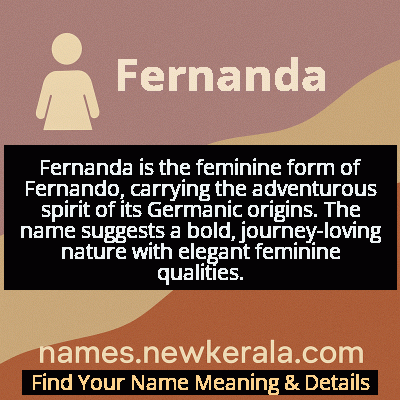Fernanda Name Meaning & Details
Origin, Popularity, Numerology Analysis & Name Meaning of Fernanda
Discover the origin, meaning, and cultural significance of the name FERNANDA. Delve into its historical roots and explore the lasting impact it has had on communities and traditions.
Name
Fernanda
Gender
Female
Origin
German
Lucky Number
9
Meaning of the Name - Fernanda
Fernanda is the feminine form of Fernando, carrying the adventurous spirit of its Germanic origins. The name suggests a bold, journey-loving nature with elegant feminine qualities.
Fernanda - Complete Numerology Analysis
Your Numerology Number
Based on Pythagorean Numerology System
Ruling Planet
Mars
Positive Nature
Generous, passionate, energetic, and humanitarian.
Negative Traits
Impulsive, impatient, moody, and can be overly emotional.
Lucky Colours
Red, maroon, scarlet.
Lucky Days
Tuesday.
Lucky Stones
Red coral, garnet.
Harmony Numbers
1, 2, 3, 6.
Best Suited Professions
Military, sports, philanthropy, leadership roles.
What People Like About You
Courage, energy, leadership, generosity.
Famous People Named Fernanda
Fernanda Montenegro
Actress
First Brazilian nominated for Academy Award for Best Actress
Fernanda Torres
Actress and Writer
Award-winning Brazilian actress and author
Fernanda Lima
Television Host and Model
Internationally recognized Brazilian TV host and model
Fernanda Contreras Gómez
Tennis Player
Mexican professional tennis player representing her country internationally
Name Variations & International Equivalents
Click on blue names to explore their detailed meanings. Gray names with will be available soon.
Cultural & Historical Significance
Extended Personality Analysis
Individuals named Fernanda are typically characterized by their bold, adventurous nature combined with deep emotional intelligence and social grace. They possess an innate curiosity about the world and a willingness to embrace new experiences, making them natural explorers in both literal and metaphorical senses. Fernandas often demonstrate remarkable resilience and determination, approaching challenges with strategic thinking and unwavering commitment. Their leadership style tends to be inclusive and inspiring, drawing people toward their vision through genuine connection rather than authority alone. Emotionally, they balance strength with sensitivity, capable of providing steadfast support while pursuing ambitious personal goals. This combination of adventurous spirit and emotional depth makes Fernandas particularly effective in careers requiring both creativity and interpersonal skills, from arts and education to business and community leadership. Their name seems to shape an identity that values both individual achievement and meaningful relationships, creating women who are both accomplished and deeply connected to their communities.
Modern Usage & Popularity
In contemporary naming practices, Fernanda maintains strong popularity throughout Latin America, consistently ranking among the top names in Brazil, Mexico, Chile, and Argentina. Its appeal lies in its perfect balance of traditional roots and modern sensibility, offering parents a name that feels both classic and fresh. The name has shown remarkable staying power, avoiding the dramatic peaks and valleys of more fashionable names while gradually gaining recognition in English-speaking countries through cultural exchange. Recent trends show Fernanda being embraced by parents seeking names with international flair and meaningful heritage, particularly in multicultural families. The name's versatility allows it to suit various personalities, from creative artists to corporate leaders, while its elegant sound and positive associations ensure continued relevance. Social media and global connectivity have also contributed to Fernanda's modern appeal, as the name travels easily across cultures while maintaining its distinctive character and rich historical background.
Symbolic & Spiritual Meanings
Symbolically, Fernanda represents the archetype of the courageous journeyer—someone who embraces life's adventures with wisdom and grace. The name embodies the metaphorical journey of self-discovery, suggesting a person who navigates life's challenges with both bravery and emotional intelligence. In many interpretations, Fernanda symbolizes the balance between exploration and rootedness, representing individuals who can venture into unknown territories while maintaining strong connections to their origins and values. The name also carries connotations of protection and guidance, evoking the image of someone who not only undertakes personal journeys but also helps others find their path. In psychological terms, Fernanda represents integrated femininity—combining strength with compassion, ambition with empathy, and independence with deep relational bonds. This rich symbolic tapestry makes the name particularly meaningful for those who value personal growth, cultural heritage, and the transformative power of life's journeys, both literal and metaphorical.

